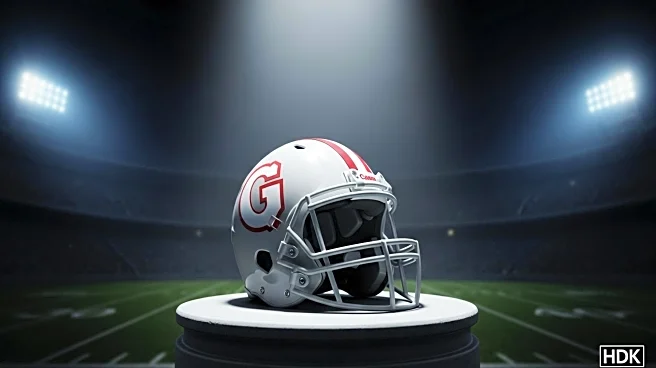What's Happening?
Glen Powell stars in and co-creates the new Hulu series 'Chad Powers,' a football comedy that follows the story of Russ Holliday, a former college quarterback who attempts to revive his career under the alias Chad Powers. The series, which premieres on Hulu, is a blend of humor and drama, drawing inspiration from a 2022 sketch featuring Eli Manning. The show explores the complexities of college football, including the impact of name, image, and likeness (NIL) deals. Powell, alongside co-creator Michael Waldron, aims to create a series that is both entertaining and rooted in a genuine love for the sport. The show features contributions from Peyton and Eli Manning, who serve as executive producers.
Why It's Important?
The series 'Chad Powers' highlights the evolving landscape of college football, particularly the influence of NIL deals and the transfer portal on team dynamics. By incorporating real-world elements, the show offers a satirical yet insightful look at the pressures faced by college football programs. This narrative is significant as it reflects broader changes in college athletics, where financial and reputational stakes are increasingly high. The involvement of the Manning brothers adds authenticity and draws attention to the series, potentially influencing public perception of college sports and the entertainment industry's portrayal of athletic narratives.
What's Next?
As 'Chad Powers' premieres, it is likely to spark discussions about the portrayal of college sports in media and the real-life implications of NIL deals. The series may influence future sports comedies and dramas, encouraging creators to explore similar themes. Additionally, the show's reception could impact the careers of those involved, including Glen Powell and the Manning brothers, by showcasing their versatility and appeal in the entertainment industry.
Beyond the Headlines
The series delves into the ethical and cultural dimensions of college sports, questioning the balance between athletic success and personal redemption. It also touches on the role of boosters and financial backers in shaping college programs, offering a critique of the commercialization of college athletics. These themes may resonate with audiences, prompting reflection on the values and priorities within collegiate sports.











